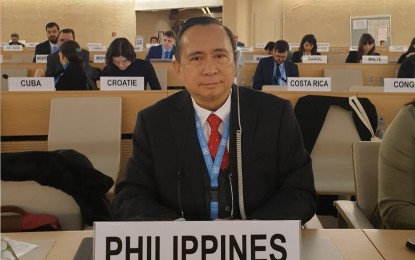
Ambassador Evan P. Garcia, Permanent Representative of the Philippines to the UN and other organizations in Geneva (DFA photo)
GENEVA, Switzerland – The Philippine government on Monday emphasized before the United Nations (UN) Human Rights Council its openness to address allegations of human rights violations in the country, through domestic accountability mechanisms, on the basis of facts.
Ambassador Evan P. Garcia, Permanent Representative of the Philippines to the UN and other organizations in Geneva, said allegations raised before the Council by groups like Ecuvoice and Karapatan, “have no basis on facts”, and that these groups have refused to provide data that will enable the government to investigate, monitor and resolve alleged cases of human rights violations.
Garcia’s speech before the Human Rights Council 43rd Regular Session held at the Salle XX, Palais des Nations was in response to Ecuvoice, human rights group Karapatan, and some Civil Society Organizations (CSOs) that claimed alleged widespread attacks and harassments by the Philippine government against defenders, church people, indigenous peoples, lawyers.
Citing that “facts are the starting point of any meaningful action”, he informed the Council that the Philippine government has repeatedly invited parties bringing up the allegations “to provide specific information to enable our competent authorities to investigate these cases and properly respond, and within the country’s framework of good governance and rule of law, to hold to account human rights violators and to provide redress to their victims”.
“These parties have consistently rejected the government’s call for cooperation within domestic mechanisms, towards the investigation, monitoring and resolution of alleged cases. Instead, they continue to travel around Europe presenting fabrications on facts, numbers, and realities in the Philippines,” he said.
The refusal of these groups to engage in dialogue, Garcia said, provides a reason for the Council “to question the agenda of these parties, the legitimacy of their advocacies, and their lack of genuine interest in validating cases towards their resolution.”
He cited the example of Karapatan, and “its track record of making claims that it is not able to substantiate.”
He reiterated that the Council should be able “to distinguish between honest advocates of human rights and opportunists who exploit the noble mantle that we rightly endow human rights defenders,”, citing that some of the actors raising these allegations are affiliated with the Communist Party of the Philippines – New People’s Army – National Democratic Front (CPP-NPA-NDF).
He added that the playbook of the terrorist group, which has been used consistently to discredit democratically-elected administrations of the Philippines “assails the UN Secretary General’s guidance that human rights must never be used as a vehicle for pursuing hidden agendas.”
Garcia said actors affiliated with the CPP-NPA-NDF do not represent the multitude of civil society actors in the country, adding that “there are over 100,000 registered non-profit organizations, attesting to the dynamic and free civic space in the Philippines, and our people’s highest regard for civil society’s role in nation-building.”
The government, he said, aims to secure the future of 110 million Filipinos, and the administration’s good governance agenda stands on solid programs that are responsive to the socio-economic conditions and human rights challenges on the ground.
“The allegations raised last Friday (March 6) do not hold their weight against the 87% approval rating by the Filipino public for the administration,” Garcia added. (DFA PR)
